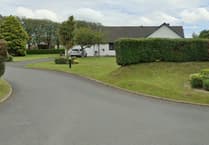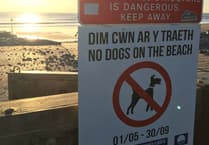A Llanon and Llansantffraed group is calling to save ‘unique’ evidence of a medieval farming system in fields surrounding the two villages.
Large open fields were divided into strips, or ‘slangs,’ and allocated to village people who could grow their own food on them.
The Save Our Slangs group fears these ‘centuries-old’ layouts are under threat from speculative planning for housing and building work.
Building work done in the past has already covered some of the slangs, but more work could ‘obliterate’ them.
Head of the Department for History and Welsh History at Aberystwyth University, Professor Phillipp Schofield, said: “The surviving field system at Llanon and Llansantffraed - elements of which are undoubtedly more than seven centuries old - is an important part of the west Wales heritage; a number of historians have remarked upon the organisation of the strips or slangs and their rare survival into the modern age.
“In the Middle Ages, across Britain, large open fields were often divided into strips, each farmed by individual villagers as well as the lord of the manor. Many such field systems fell into decline after the Black Death in the middle of the 14th century and were often converted into pasture.
“Almost uniquely for Wales, these strips survive and can still be seen at Llanon and Llansantffraed.”
Professor Schofield explained that you can tell these strips existed because of the shape they take up.
He said: “The area still includes natural stone boundary marks as well as evidence for the ancient planting of boundaries such as blackthorn hedges. These boundaries are often curved in shape, taking an almost S shape to them.
“These shapes were a result of how ploughing was done back then. Medieval ploughing was done with livestock, and it took a lot of room to turn them. What often happened was that ploughers would begin turning before they reached the end of their strip, so instead of having straight strips, you’d often have S-shaped strips, designed to give farmers the room to turn, and still plough effectively."
Save Our Slangs is planning to begin community projects on the site in the future. They hope these projects will engage people and raise awareness of the site’s existence and significance. You can learn more about the group and the site by emailing them at [email protected].





Comments
This article has no comments yet. Be the first to leave a comment.